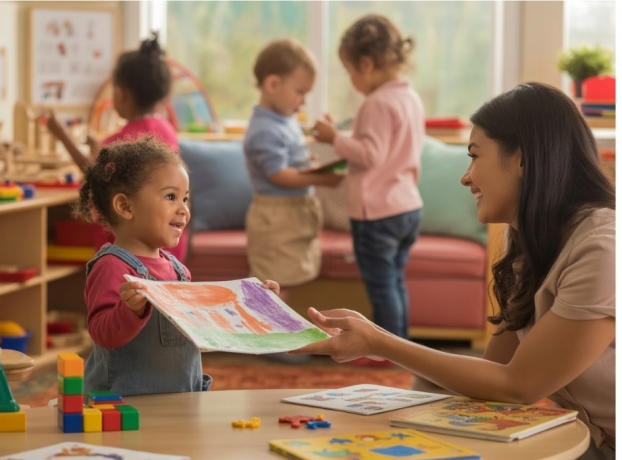The Power of Early Beginnings
The first few years of a child's life are a remarkable time of exploration, curiosity, and imagination. During these early stages, children begin to absorb the world around them—learning not just words or colors, but emotional cues, problem-solving habits, and the joy of discovery itself. In many ways, the foundation of lifelong learning is built during these seemingly small, everyday moments. Whether it's stacking blocks, sharing snacks with a friend, or listening to a story read aloud, each experience contributes to how a child learns to think, feel, and connect.
Modern education recognizes that early experiences have profound effects on brain development. Studies show that structured learning environments with play-based teaching methods can dramatically improve cognitive skills, attention, and emotional resilience. Beyond numbers and letters, these settings create safe spaces where children are free to make mistakes, express ideas, and grow at their own pace.
Learning Beyond the Classroom
A positive early learning environment does not simply teach—it cultivates character. In a world that often emphasizes academic results, it's essential to remember that curiosity and confidence grow hand in hand. Children thrive when they feel heard, supported, and valued. Classrooms designed for young learners often integrate storytelling corners, music sessions, art projects, and outdoor play, creating a blend of structure and freedom that mirrors the rhythm of childhood.
For many parents, choosing the right early learning setting can be a deeply personal decision. Families looking for trusted educational spaces, such as daycares in Dayton, often seek more than convenience; they seek a nurturing community that understands the emotional and developmental needs of every child. A well-rounded environment provides not only safety and supervision but also mentorship and encouragement that fuel confidence from the inside out.
The Science of Play and Progress
One of the most powerful tools in early education is play. Far from being mere entertainment, play helps children experiment with concepts, develop language, and understand emotions. Building with blocks teaches physics in miniature. Pretend play develops empathy and communication. Even a simple game of tag introduces strategy, coordination, and social awareness.
Educators who specialize in early childhood learning often describe play as “the child's language.” Through guided play, teachers can introduce math, science, and problem-solving concepts in a way that feels natural and exciting. When children are encouraged to ask “why” and “how,” they begin developing critical thinking skills that will serve them for a lifetime.
Building Emotional Intelligence Early
A key part of a child's success is emotional intelligence—the ability to recognize, understand, and manage emotions. Learning centers that emphasize emotional awareness help children navigate challenges and build empathy. Group activities, cooperative play, and reflective conversations teach kids that it's okay to feel frustrated, sad, or excited—and that every feeling has value.
This kind of holistic education allows children to develop inner strength and social grace simultaneously. When they experience kindness and patience from adults, they internalize those traits. When they see teamwork modeled during playtime, they learn collaboration. The lessons of emotional intelligence are subtle yet enduring, shaping how a child interacts with the world long after the school day ends.
A Partnership Between Teachers and Families
The relationship between educators and families is central to a child's growth. Open communication ensures consistency between home and learning environments. Parents who engage in their child's learning journey—by reading stories at night, encouraging curiosity at home, or participating in school events—create a seamless web of support that amplifies every positive experience.
The best learning communities invite parents to be part of the process, not just observers. When families share feedback and celebrate milestones together, the entire environment becomes more cohesive. It transforms from a simple educational space into a shared mission—one that unites teachers, caregivers, and parents in the collective goal of raising confident, happy children.
Supporting Growth Within the Community
A thriving community often reflects the care it invests in its youngest members. Across many towns, centers dedicated to early learning are becoming community anchors—places where families connect, friendships form, and values are passed down. For parents balancing careers and home life, access to trusted educational environments offers peace of mind and emotional stability.
That's why local educational networks, including daycares in Dayton, play such a vital role in shaping community well-being. They not only provide reliable care but also foster growth, curiosity, and creativity—laying the groundwork for stronger families and more compassionate neighborhoods. Every child who learns in a nurturing setting becomes a future citizen who values empathy, curiosity, and community spirit.
The Lifelong Impact of Early Learning
The long-term benefits of quality early education reach far beyond childhood. Research continues to show that children who experience supportive and structured learning environments are more likely to excel academically, form healthy relationships, and develop resilience in adulthood. These benefits are not limited to intellectual outcomes—they extend to self-esteem, decision-making, and emotional health.
As the world evolves, so too must the way society approaches education. Early learning is not a luxury—it's an investment in the human potential that defines tomorrow's communities. Every positive interaction, every spark of curiosity, and every word of encouragement contributes to shaping confident, capable, and compassionate individuals.
A Future Built on Care and Curiosity
Ultimately, the success of future generations depends on the nurturing foundations laid today. By embracing environments that celebrate exploration, kindness, and imagination, families and educators together build bridges toward a brighter future. Every child deserves a place where they can feel safe, inspired, and free to dream—a space that reminds them the world is full of wonder, waiting to be discovered one small step at a time.






